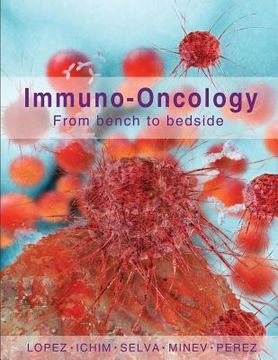Synopsis "Immuno-Oncology: From Bench to Bedside (in English)"
The immune system offers the possibility of treating cancer and its metastasis without the toxicities of chemotherapy. Unfortunately, despite recent medical advances, overall survival of patients is still relatively dismal. Advances such development of Provenge, which is the first widely accepted immunotherapy of cancer have attracted media attention and interest, however survival advantage was only 3 months in double blind trials. In this book we take a multi-disciplinary approach to analyzing in a highly referenced and technical manner the various cellular, biochemical and immunological changes that occur in cancer patients. By categorizing what cancer does to the body, and how the body tries to fight the cancer, an overall picture is painted of various interventions and combination interventions that can be tried in order to maximize probability of patient improvement. Various conventional and unconventional approaches to cancer are described in this volume, including macrophage activation therapy, oxidative medicine, lymphokine activated killers, and non-specific immune stimulants. Significant effort was made by the authors to detail how various components of the immune system collaborate in the recognition of cancer cells, how cancer cells avoid immune attack, and means of derepressing immunity using chemical, cellular, and genetic approaches. Specific tumor immune evasion mechanisms that are described include: a) the tryptophan-catabolizing enzyme indolamine 2,3 deoxygenase (IDO), which selectively induces suppression of cytotoxic T cells through anergy, apoptosis, and T regulatory cell generation; b) IL-10, a cytokine produced by tumor cells, as well as tumor-associated macrophages, which induces generation of T regulatory cells; c) cancer derived exosomes, which act as nanoparticle vesicles, that directly induce apoptosis of tumor-reactive T cells, as well as assist in formation of extracellular matrix that is receptive to tumor metastasis; d) soluble HLA-like molecules including MICA, which block the activation of natural killer cells, the cells that are capable of killing tumors which have downregulated antigen presentation; e) arginase, an enzyme produced by M2 macrophages, which produces an immune suppressive localized environment; and f) tumor lactic acid accumulation, which blocks cytotoxic activity of T cells, while at the same time allowing for survival of T regulatory cells, which in turn suppress the immune system. In addition to overviewing how cancer suppresses the immune system, discuss how the immune system suppresses cancer. Detailed descriptions are provided of immune modulators that have demonstrated clinical efficacy signals dating back from the days of Coley's toxins, all the way to the current immune checkpoint inhibitor trials. Specific areas of concentration include: a) cytokine induced killer cells; b) lymphokine activated killers; c) BCG; and d) cancer vaccines. We trust that the current volume will provide its readers not only with details of the immune-tumor interaction, but will also provide solid support for novel experimental approaches to cancer, including combination of T regulatory cell depleting chemotherapies with immunotherapy, as well as combinations of intravenous nutrients with immune stimulators.

